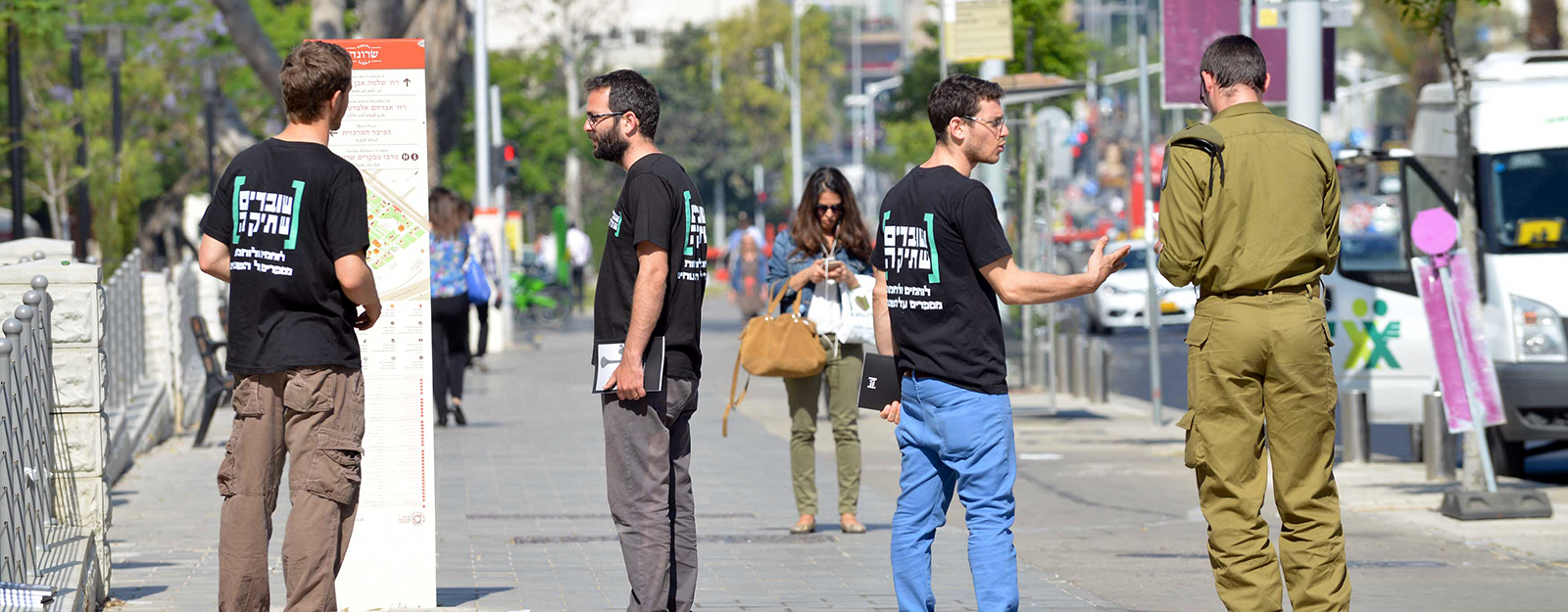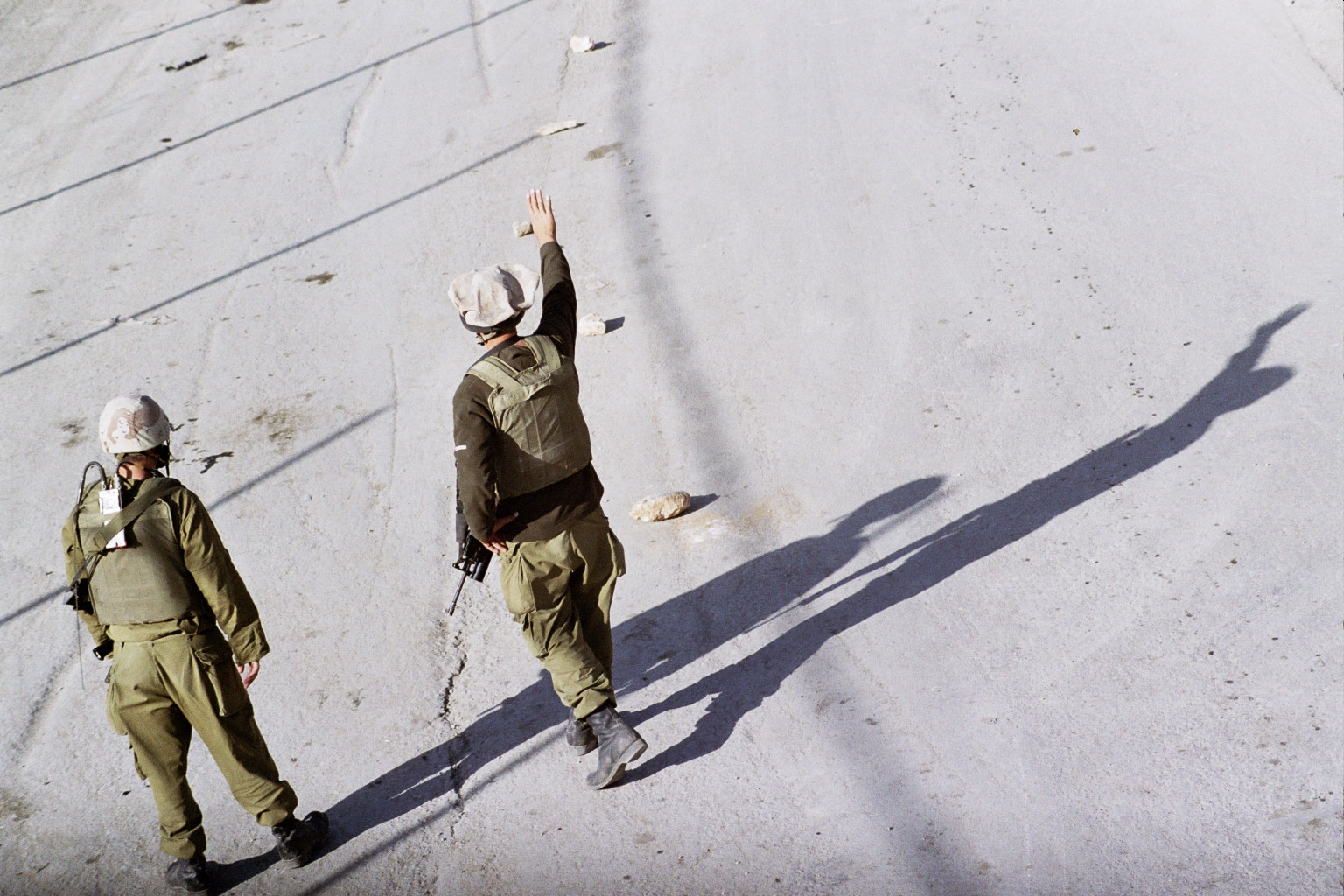How often?Once a week. But that wasn’t the whole battalion. During the five months there were maybe six battalion operations and everything else was a company operation, mostly searches and trying to bring out terrorists.
How deep did you go in? Mostly not too deep, but also not just four houses in from the border. The deeper operations were, I’d say, a kilometer and a half to two kilometers in.
I want to ask about the preparations. For example, what about rules of engagement, civilians? They said the objective was to search houses looking for weapons. Of course, part of the objective is also to see —there were operations where they deliberately fired for no reason, but the battalion commander said the shooting was to bring out terrorists so we could kill a few.
Where did you shoot? There was a specific operation where I remember we had a force of grenade launchers, machine guns, and maybe even a heavy machine gun trained on some houses. They didn’t fire at the houses, but they fired randomly, around the houses. Not shooting to hit anything, but to try to bring out terrorists. In terms of preparation, I don’t really remember whether they actually said “It’s not black and white,” and they didn’t tell us to shoot at everyone, it’s not like Operation Cast Lead,* where there was insane excitement.
How was the operation run? You finished the briefings... There are operations on foot, there are heavy APCs, you arrive at the entry point, it doesn’t matter if it’s a company or a battalion, there’s a marching order, you go, and at some point you take the target, every squad captures a specific house. You go in at night, get to a house, go into the house and verify that no one’s armed, you never go in wet, there’s also no wet cover, apart from a few specific operations where there was fire for show, to try and draw fire. We never used grenades, maybe only during Hot Winter.
The shooting for show, where was it aimed? I don’t know because I wasn’t in that platoon. I know that the intention wasn’t to hit anyone, but they did shoot toward the houses. I had a good friend who was in the battalion, and in the battalion commander’s command force, not with him personally but around, and he heard him talking with someone on the radio saying, “Listen, pal, you’ve got no idea what’s going on here,” during the shooting for show. There was one operation where they were so worked up about firing grenades from launchers or a small grenade launcher they got from the paratrooper patrol or I don’t know what, they brought it for the operation—the small launcher is lighter so it’s better.
You went into the houses and then? In most cases they searched the houses and then set up positions there. They searched for weapons and armed men, and then they’d set up snipers or sharpshooters, and sometimes they had to break the tiles to fill sandbags and they’d do 2/4 or 2/2 [Hours on duty: 2/4 means two hours on, four hours off], depending on the number of men in the squad or the platoon. It was flexible until they packed up.
What did they do with the people who lived in the houses? They’d put them together in one room, usually with their hands tied. I don’t remember whether they were blindfolded, maybe only rarely, and they’d put a guard there. I don’t remember if there was violence toward the people other than... there was no resistance on their part. I remember some rough things in places on the border, on the outskirts, totally rural areas where the administration there doesn’t give a shit, they live in shacks, it stinks. There’s nothing like that in the West Bank in terms of poverty.
Who would they handcuff? Not women, I think. Only men.
Was there a certain age they’d handcuff? I don’t think the elderly. In Hot Winter there was one house with a whole tribe—we didn’t cuff them there, we just put them in a room with a guard.
What about a twelve-year-old boy? I don’t think so. Maybe I exaggerated, and most of them weren’t cuffed. There were operations where they’d go in with heavy APCs and come back on foot. There was one operation where we brought back a lot of people for interrogation with the Shin Bet, not particular suspects, just to get information and recruit collaborators, that’s my guess. They’d load up men of a certain age on a large truck and it would go into Israel. Apparently the Shin Bet interrogated them.
Who chose them? Did a Shin Bet agent come with you? For the most part, no. That happened maybe once, there was one particular operation I remember that we came back on foot with a few detainees. What’s fucked up is that they came back blindfolded, it’s not clear why, what secrets were they going to tell, it’s not like they were in a Merkava Mark IV (An Israeli advanced tank model), right? They were handcuffed together and it was tough walking there, even for us. Some of them lost their sandals on the way and they went barefoot in a place where it’s not nice to walk barefoot. It was a nightmare. For me, too . . . In all these operations I just wanted to get there, the operations were hard, physically, and not only because they were physically hard, but because they were just hard. I felt bad for them.
How many were there? Not many, not a long convoy, but that was just my company. The operation I was talking about was a battalion operation, so maybe in other companies.
Was this something that surprised you? No, it was the operation’s objective, to bring detainees for interrogation.
Who gave the briefing? A platoon commander.
During the briefing when they said you’d be coming back with detainees, what did they say? You’re detaining people for interrogation, I don’t remember if they said the Shin Bet. Sometimes they defined that as a secondary objective. Bottom line, in the briefings they didn’t talk about overall objectives, rather they’d explain what you have to do and they’d also explain things as it was going on. The operation was searches and “maybe there’ll be some terrorists to kill,” mostly it was weapons searches and if there was something for intelligence.
I wanted to ask if drawing fire was a method that worked. I don’t remember it working. There were a few operations like that. That was a change that happened after two months during that time, and they started doing that. There was a period of foot operations, and after that operations in the heavy APCs, and after that, toward the end, sometimes we did it one way and sometimes the other.
When you sat at the window of a house, did you need permission from someone to shoot? It depends. If I see someone armed—no. I say no because I only remember things in general. If you see someone armed— then no, if I see someone looking suspicious because he’s trying to hide or because he has binoculars or a cell phone —then yes. That’s what I understood, at least.
After you’d come back would they tell you whether there had been any hits? Yes, but in general, if there was something to say about the effect of the operation, then yes. After Hot Winter they made sure to say it was successful, a lot of terrorists were killed, and that it had a deterrent effect. But after [an] operation when we thought the terrorists had been killed and it turned out they’d just been wounded, it was surprising and frustrating. Surprising because, for example, one squad commander in my platoon had shot a terrorist who was walking with a Kalashnikov and a cell phone in the street and hadn’t known he was thirty meters from the IDF. He shot him in the middle of his body and he fell, and then they threw two grenades at him to make sure he was dead, and afterward they said that the terrorists hadn’t been killed.
By the way, during this period, was it legal to verify a kill? I have no idea. Why? After the incident where they dismissed the platoon commander, we had a briefing from the brigade commander, who sat with the battalion commander in the room, and our platoon sat there while he questioned us to understand better what had happened. And then he gave clear orders about clashes and how they’re supposed to end: “You go up to the body, put the barrel between the teeth, and shoot.” Afterward, I heard that verifying a kill was illegal. That’s what I know, too. I know they came up with a laundered phrase, “verify a neutralization.”









 testimonies
testimonies  media & content
media & content 










 The brigade commander explained, “You go up to the body, put the barrel between the teeth, and shoot”
The brigade commander explained, “You go up to the body, put the barrel between the teeth, and shoot” 

 terms of use & privacy policy
terms of use & privacy policy